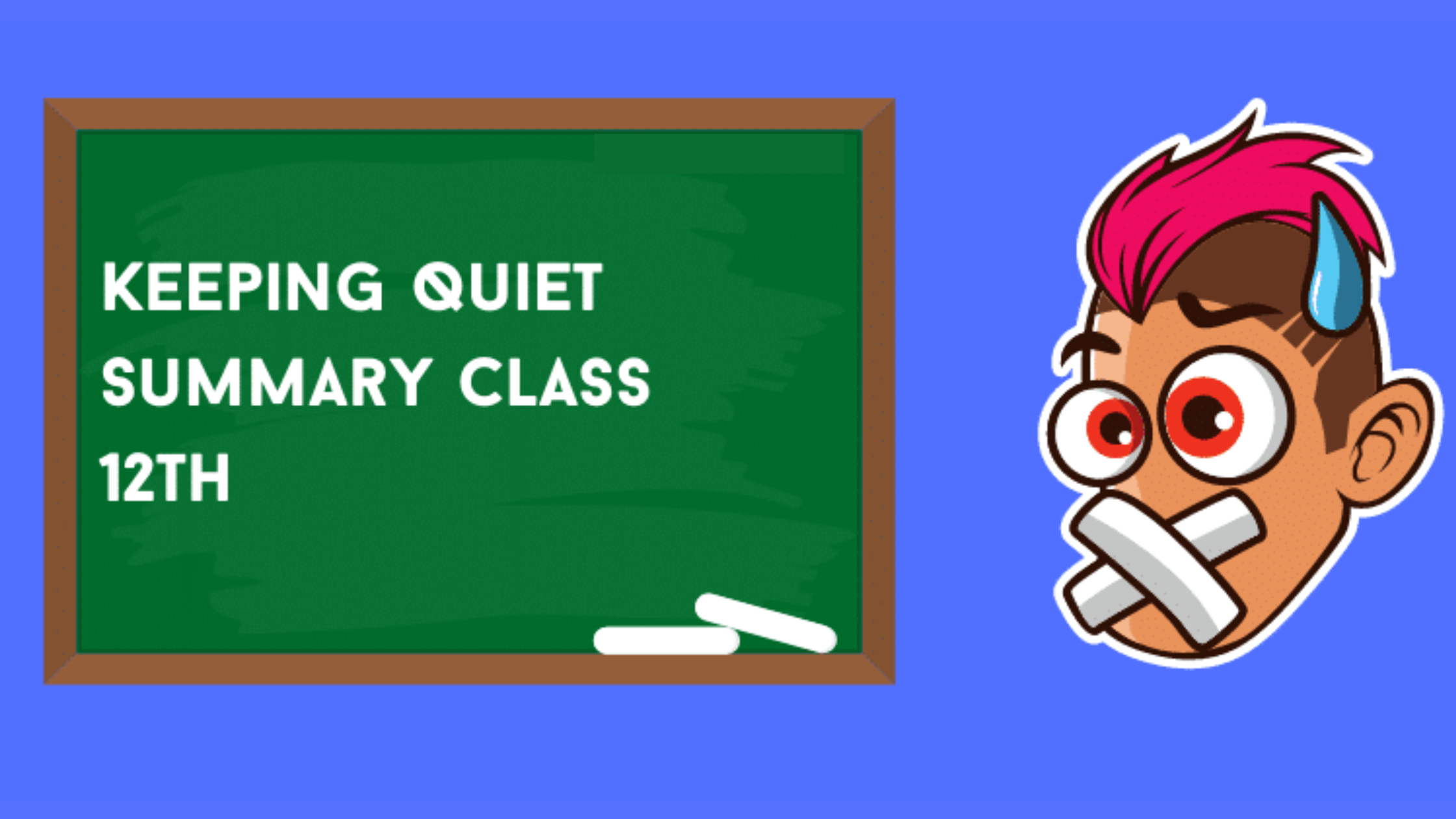Here we are providing you with a summary of the poem keeping quiet class 12th. The poet Pablo Neruda wrote this in Spanish and later on it was translated into English lays emphasis on introspection, retrospection, and bodily sensations.
The poet appeals to the readers to grasp the idea of understanding nature and society. So let us read the Keep Quiet Summary along with the brief introduction of the author, which may be asked in the exams.
Keeping Quiet – About the Author
Pablo Neruda was a diplomat – politician and won the Noble prize for literature in the year 1971. He wrote in green ink which was his personal ideogram. His writings are simple, wherein lies their beauty.
It was first written in Spanish, and the emphasis of this poem is based on introspection and retrospection. The poet feels that some soul–searching is required for us to be at peace with ourselves and others.
You can also watch the video on our channel EDUGOGUE for a better understanding of the Poem.
https://youtu.be/Ck5WV2Cd3fM
Keeping Quiet Poem Theme
The main idea focuses on peace and silence and enduring humanity and brotherhood. The poet expresses anger and at the same time, he is quiet in himself speaking in a very calm fashion.
He firmly believes in the idea of serenity and the best way to is not an explosion of expressions but wisdom.
The poet wants the readers to focus on introspection and retrospection to acquire the intellect to understand the purpose of the world.
Rhyme scene of Keeping Quiet
The poem is free verse and does not contain any type of rhyme scene.
Keeping Quite Summary Class 12th
First stanza
Now we will count to twelve and we will all keep still. For once on the face of the Earth let’s not speak in any language, let’s stop for one second, and not move our arms so much.
The poet requests everyone to count up to twelve and the number twelve represents 12 hours of the clock or months of the year. And let there not be any rush for the engines to be at a halt and machines must stop. He implored all of us not to speak and stop moving our arms. ‘Arms’ here means the weapons used by different countries to invade. Therefore, he is demanding peace from all.
Literary devices
- Assonance: Use of vowel sound ‘o’ and ‘e’
- Anaphora: Two consecutive lines starting with the word (‘Let’s) let’s not speak in any language, let’s stop for one second,
- Alliteration: the repetition of a consonant sound at the start of 2 or more closely placed words.
- ‘we will’ – ‘w’ sound is repeated
Second stanza
It would be an exotic moment without rush, without engines, we would all be together in a sudden strangeness. Fishermen in the cold sea would not harm whales and the man gathering salt would look at his hurt hands.
The poet wants that fishermen should not harm the whales and those men who are gathering salt must take care of their hands. Everyone should keep calm and stand united with each other, it will look strange as something like this has never happened before. He further advised not to run after materialistic things instead they should look at how much damage they have caused.
Literary devices
- Alliteration- ‘we would’ – ‘w’ sound is repeated, ‘sudden strangeness’ – ‘s’ sound is repeated, ‘his hurt hands’ – ‘h’ sound is repeated
Third stanza
Those who prepare green wars, wars with gas, wars with fire, victory with no survivors, would put on clean clothes and walk about with their brothers in the shade, doing nothing. What I want should not be confused with total inactivity. Life is what it is about; I want no truck with death.
The poet wants us to introspect that how we have destroyed our green cover by deforestation, mining, or fishing to realize the aftermath of our actions. He wants all the people to wear new clothes. Here new clothes mean to follow a new approach to realize that mass war and killing is not the solution and will lead to no life on the earth.
The poet wants us to follow the approach of fraternity and unity. He does not say us to be halt forever but to stop to introspect our actions.
Literary devices
- Alliteration: ‘wars with’ – ‘w’ sound is repeated, ‘clean clothes’ – ‘c’ sound is repeated
- Assonance: use of vowel ‘o’ (victory with no survivors, would put on clean clothes and walk about with their brothers)
- Repetition: use of ‘war’
Fourth stanza
If we were not so single-minded about keeping our lives moving, and for once could perhaps a huge silence might interrupt this sadness of never understanding ourselves and of threatening ourselves with death.
Now he clarifies to his readers that he doesn’t want to be a passive person rather asks us that we should stop and look at our deeds that what we have done to our earth by running after greed and exploiting others.
Further, he wants us to remain in action but to focus on the results as well and urges them to stop for a while to relish what we have achieved so far. After that, he wants us to take some time and look for the damages as well. Some kind of melancholy surrounds us that we forget to see what we have and in order to extinguish our thirst, we are running and creating problems for humanity all over the earth.
Literary devices
- Alliteration: we were, so single-minded
- Enjambment: and for once could perhaps a huge silence…of threatening ourselves with death.
Fifth stanza
Perhaps the Earth can teach us as when everything seems dead and later proves to be alive. Now I’ll count up to twelve and you keep quiet and I will go.
The poet wants all of us to a lesson from our creation as our earth undergoes changes day by day in winter changes taking place. So we need to take a pause and rethink so that everything comes back to life like a reincarnation of one’s soul.
The poet tries to convey the purpose of his message and asks them once again to count up to twelve and move to the path of peace and harmony. By giving an example of nature like trees, birds, etc wants to say that humans should judge upon their actions done to our creations. Finally, he ends up saying that now he will count up to twelve so that we all may become quiet and calm. After saying this he says ‘I will go’ because he wants them to be left alone to retrospect on it and work in the direction of peace.
NCERT Solutions For Class 12th Keeping Quiet Poem
Q1. What does the title of the poem suggest to you? What do you think the poem is about?
The title of the poem suggests the importance of silence. The poem is about the importance of self-examination and introspection. It is also an appeal for universal harmony.
Q2. What will counting up to twelve and keeping still help us achieve?
According to the poet, taking a break from our monotonous routine by ‘counting up to twelve’ and ‘keeping still’ will help us understand ourselves and those around us better. The quietness will aid our understanding of the significance of peace and tranquility in this age of futile activities. Thus, they will help us in introspection and self-analysis.
Q3. Do you think the poet advocates total inactivity and death?
Although the poet believes that silences assist in introspection and help in taking a break from the world of frenzy activity, he does not advocate total inactivity and death. Rather, he believes that observing stillness once in a while helps people to spring back into action, rejuvenated.
Q4. What is the ‘sadness’ that the poet refers to in the poem?
The poet refers to the ‘sadness’ of failing to understand oneself in the monotonous everyday existence. He also finds it sad that humanity is moving towards its own ruin owing to its unanalyzed actions. He regrets the rush of outdoing others that have made us forget the values of humanity.
Q5. What symbol from Nature does the poet invoke to say that there can be life under apparent stillness?
The poet uses the symbol of the earth to illustrate the point that there can be life under apparent stillness.
Conclusion
We have gone through the summary of keeping quiet where we got the message of introspection and retrospection of ourselves to wait and watch our actions before it is too late. He further added to watch our actions and stop our activities so that all shall move towards peace and harmony and ponder over intellect and be active to endure fraternity and spreading awareness.

